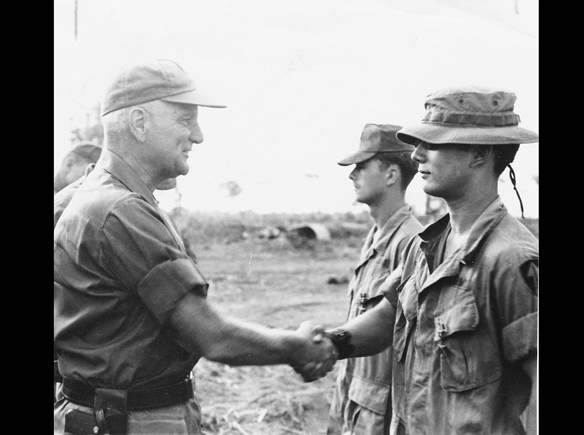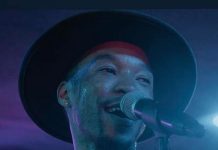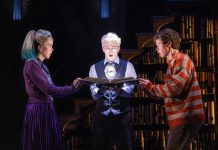As the artillery shells from his battery flew overhead that first night of the fire mission, the only thing that Scott Takahashi could think of was, “I’m never going to be able to sleep for an entire year.”
As the artillery shells from his battery flew overhead that first night of the fire mission, the only thing that Scott Takahashi could think of was, “I’m never going to be able to sleep for an entire year.”
Takahashi did learn to fall asleep though, through the deafening noise and the dirt that fell from the ceiling onto him in his hooch with each 155 round that sailed overhead. He learned to sleep and to adapt to his new surroundings; Battery A of the 2nd Battalion 35th Artillery, deep in-country in Viet Nam, even though he wasn’t even supposed to be there.
This wasn’t a Private Benjamin moment for the young Gardenan, the moment where Goldie Hawn thinks she has somehow been sent to, “the wrong Army.” Takahashi knew he was in the right army, he just didn’t think that someone with his physical deficiency could be sent to a war-zone, especially to aim giant guns that could inflict incredible amounts of damage.
“My dad had told me when I got drafted: ‘don’t worry; with your eyesight, they’ll never send you to Viet Nam.”
It was November 1968; the height of hostilities in what had been formally known as French Indo-China. The Gardena High graduate was attending L.A. Trade Tech and Harbor College when his draft notice arrived.
“My dad had served in WW II and fought for our country, and so I knew instinctively that living in America is a privilege, and so when you are asked to go – you go.”
And so with the reassurances of his father’s comment about his eyesight ringing in his head, he arrived on his assigned day at the induction center for his physical and processing.
“When they removed my glasses and asked me to tell them what was on the eye chart, all I could say was that I knew that there was an “E” on the first line – and that was from memory. But they took me anyway.”
He “celebrated” his 20th birthday in the reception area of Fort Ord, California before moving to the barracks to begin his basic training.
“They put us all into the back of a big truck to take us there and when we stopped and they yelled for us to get out, I jumped out of the truck with my duffel bag and promptly knocked over a drill instructor!”
“Great,” I thought. “We haven’t even started basic training and already I’m screwing up. It cost me twenty-five pushups, the first of many.”
For the next several weeks of basic, and following that with his training as a supply clerk, Takahashi not only made up for his first Faux Pas, but proved himself to be a very capable soldier. Impressive enough that after all of his training as a clerk, he was going to serve a higher calling.
“I was supposed to be going to Fort Sam Houston until one day an executive officer walked up to me with a big grin on his face to let me know I was going to Viet Nam. So much for my dad’s theory of military fitness.”
At Bien Hoa, he was assigned to an artillery unit, even though he had no training with the heavy guns, or even on the hazards of the country itself. He worked with the unit in Bien Hoa for three weeks before being sent out into the field for what would amount to many missions over the next 13 months.
“We were in the field about 75 percent of the time, and I soon learned that artillery and humping 155 shells was tough work.”
But things were about to get a lot tougher.
“In April 1970, we were hit hard by the 33NVA Regiment.”
It was vicious battle, and Takahashi saw plenty of combat manning the berm with a machine gun. For his bravery in that fight, he earned the Bronze Star for valor.
Decades after that battle and the war had ended, and Takahashi had returned home, he is still active with his battery and has organized reunions for the surviving members. He’s also the Vice President of the 100th Battalion Club and also works with The Go For Broke Education Center, a group dedicated to educating the public about the responsibilities, challenges, and rights of American citizenship, by using the life stories of the Japanese American soldiers of World War II.
Reflecting on he and his father’s service to our country, Takahashi has no regrets. He’s proud of he and his father’s service and says that, “Combat forges bonds that are unbreakable. Sometimes we who served may disagree about exactly how things happened, but it does nothing to diminish that bond.”
To nominate a veteran or share your own story, go to Gardena Honored Veterans website at http://www.ci.gardena.ca.us/Stories/honored%20veterans.html.To learn more about the Go for Broke organization, visit http://www.goforbroke.org/
Christopher J. Lynch is a Gardena resident and is the author of Eddie: The life and times of America’s preeminent bad boy, an authorized biography of Ken Osmond, the actor who played the unctuous truant Eddie Haskel on Leave it to Beaver.
Reach Christopher at www.christopherjlynch.com www.christopherjlynch.com



















